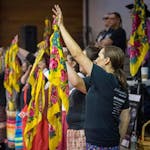Aanne Atomssa got her first paycheck at 14. The teen, who lived with her family in Addis Ababa, the capital of Ethiopia, was hired to appear in a children's show on the state-run radio station.
"Eighty Ethiopian birr was my salary," she said of the amount equivalent to about $1.50 today. "It was a lot of money back then."
Instead of splurging on herself, Atomssa spent what she'd earned buying coffee beans for her family and neighbors. Helping others, said Atomssa, who moved to the Twin Cities in 2000, has always given her joy.
But it hasn't always been easy.
In the 1990s, tensions between the Ethiopian government and opposition parties intensified. The Oromo ethnic group to which Atomssa belongs became a target, suspected of supporting the opposition Oromo Liberation Front (OLF).
Atomssa's visibility as a radio show host, combined with her networking efforts with young Oromos, didn't help; she began getting regular, menacing visits from an undercover intelligence officer.
"Every time they can't locate someone the authority is looking for, they think we are hiding them," she said. Many dissidents disappeared without a trace. Others were forced into exile.
Atomssa joined the legions heading to Yemen. In 2000, she immigrated to Minnesota, where she met her husband, Bula Atomssa, a social work supervisor for Hennepin County.
Life in her second home took off. Atomssa started a family and earned an associate degree in accounting from Minneapolis Community & Technical College, followed in 2017 by a bachelor of science in organizational administration and human resources from Metropolitan State University.
But she never lost sight of her roots.
In 2020, Atomssa, 41, founded a nonprofit that raises money to help bring clean water, sanitation pads and solar lights to people in her native country. She credits her deep sense of giving to her mother.
"Every time my grandparents sent grains from their farm in the countryside, my mom shared it with everyone," she said.
Across the globe, she continued her outreach, taking new immigrants into her home in Blaine. For 20 years, Atomssa and her husband have hosted dozens of families, helping them transition to independence by finding them jobs and collecting furniture and other items they need from the community.
"She always says manni kan rabbiiti, meaning 'house belongs to God,'" said Biftu Ibrahim, Atomssa's friend and a member of the Oromo community, the second-largest population of East African immigrants in Minnesota.
"[This is] something not easy for many of us," she said. "I remember when her family hosted a couple who came from Ethiopia for about six months until they find jobs."
Inspired by fellow women
Atomssa's parents divorced when she was in third grade. She recalls being surrounded by extended family who helped her cope.
"I didn't come from a rich family, but the most loving family," Atomssa said. "My mom and her sisters [lived] in the same neighborhood. So I used to think actually, like, all of them are my mom because they treat you so good."
Back home in Ethiopia, things were changing in hopeful ways. A popular uprising between 2014 and 2018 ushered in a leadership change. In 2018, Atomssa finally felt safe visiting the homeland she'd left 18 years earlier.
Her effort was boosted by about $100,000 previously raised by a women's group she belonged to in her Twin Cities diaspora community. The money was to be used to resettle some of the more than 5 million people displaced by a three-year-long border conflict between Oromia and the Somali regional states.
During the handover ceremony of 51 homes, however, Atomssa noticed that most of the families were women and children only; the men were gone.
"I was heartbroken with the stories they told me when I asked where the fathers were," said Atomssa, the mother of two teenagers. "Some have lost their husbands to the conflict, and others have no idea where the men are. They vanished."
So Atomssa, who works for Alight, a Minneapolis nonprofit that provides humanitarian assistance worldwide, returned to the U.S. with a new mission.
In 2020, she launched Numaan, a multifaceted nonprofit supporting single mothers and their children who were exposed to violence. Numaan means "by us" in Atomssa's native language, Afaan Oromo.
In just over a year since the launch, Atomsaa has made two trips to Ethiopia. Last year, Numaan completed a water well project that now serves a village of about 5,000 in the Oromia region. It has also delivered reusable sanitation pads to more than 1,400 schoolgirls; water filtration supplies for hundreds of pastoralists who live off animal husbandry, and solar lights.
Once a prominent community advocate, Atomssa now stays away from political discourse, preferring to focus on tangible action — one village at a time gaining access to clean water, for example.
She hopes her work inspires others to do the same in their own communities.
"Everyone talks about the problems back home," Atomssa said, "One thing I realized is that governments can be democratic or repressive. The society still exists … and it is not realistic to wait for the perfect time to act.
"Instead, we need to navigate the system and work to better people's lives. Problem-solving, not complaining, is what works for me."
Tigist Geme is a multimedia journalist with Voice of America, Horn of Africa Service.






